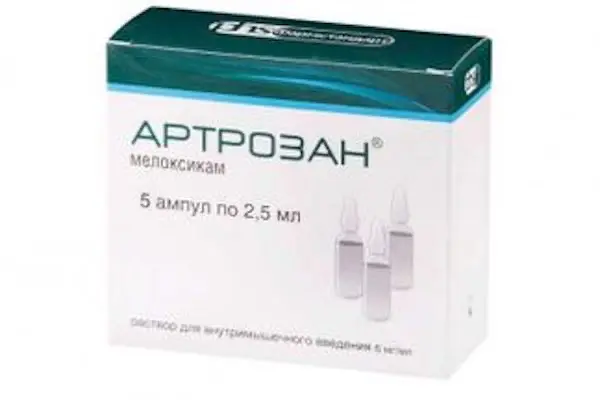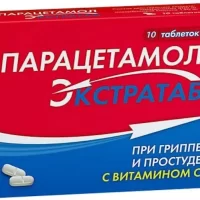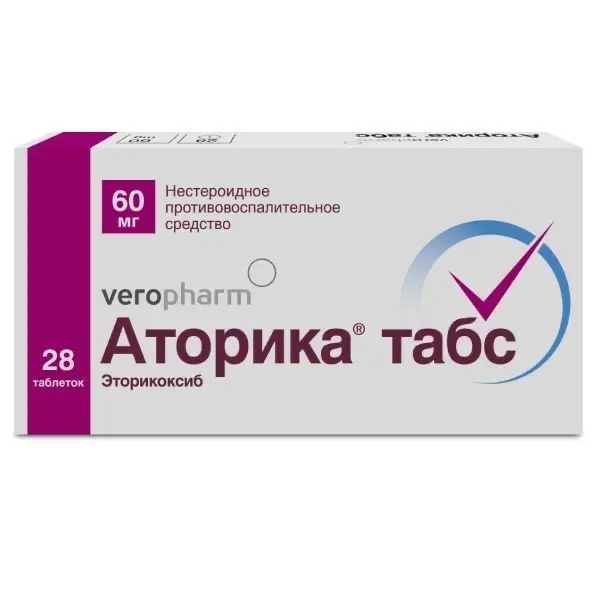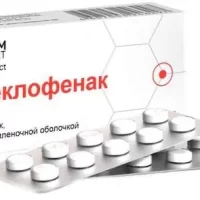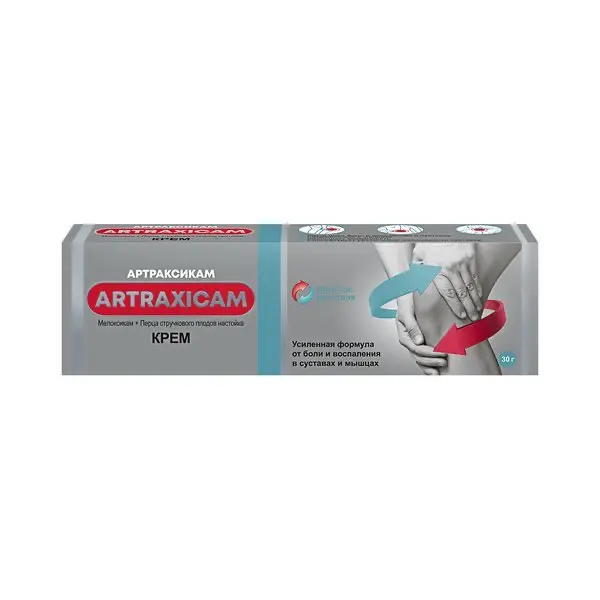Description
Arthrosan Pharmacodynamics
Meloxicam is a non-steroidal anti-inflammatory drug (NSAID), refers to enolic acid derivatives and has anti-inflammatory, analgesic and antipyretic effects. The pronounced anti-inflammatory effect of meloxicam has been established in all standard models of inflammation. The mechanism of action of meloxicam is its ability to inhibit the synthesis of prostaglandins – known mediators of inflammation.
Meloxicam in vivo inhibits the synthesis of prostaglandins at the site of inflammation to a greater extent than in the gastric mucosa or kidneys.
These differences are associated with more selective inhibition of cyclooxygenase-2 (COX-2) compared to cyclooxygenase-1 (COX-1). COX-2 inhibition is thought to provide
the therapeutic actions of NSAIDs, whereas inhibition of the ever-present COX-1 isoenzyme may be responsible for gastric and renal side effects.
The selectivity of meloxicam against COX-2 has been confirmed in various test systems, both in vitro and in vivo. The selective ability of meloxicam to inhibit COX-2 was shown when using human whole blood as a test system in vitro. It was found that meloxicam (at doses of 7.5 and 15 mg) more actively inhibited COX-2, having a greater inhibitory effect on the production of prostaglandin E2 stimulated by lipopolysaccharide (COX-2-controlled response) than on the production of thromboxane involved in blood clotting (COX-1-controlled response). These effects were dose-dependent.
In ex vivo studies, meloxicam (in doses of 7.5 mg and 15 mg) has been shown to have no effect on platelet aggregation and bleeding time.
In clinical studies, gastrointestinal (GI) side effects were generally less frequent with meloxicam 7.5 and 15 mg than with the other NSAIDs compared. This difference in the frequency of gastrointestinal side effects is mainly due to the fact that such phenomena as dyspepsia, vomiting, nausea, and abdominal pain were observed less frequently while taking meloxicam. The frequency of upper gastrointestinal perforations, ulcers and bleeding associated with the use of meloxicam was low and depended on the dose of the drug.
Indications
Starter therapy and short-term symptomatic treatment for:
– Osteoarthritis (osteoarthritis, degenerative joint disease);
– rheumatoid arthritis;
– ankylosing spondylitis;
– Other inflammatory and degenerative diseases of the musculoskeletal system, such as arthropathies, dorsopathies (e.g. sciatica, low back pain, periarthritis of the shoulders and others), accompanied by pain.
Contraindications
– Hypersensitivity to the active substance and/or any excipient of the drug.
– Hypersensitivity (including to other nonsteroidal anti-inflammatory drugs).
– Complete and incomplete combination of bronchial asthma, recurrent polyposis of the nose and sinuses, angioedema or urticaria, caused by intolerance to acetylsalicylic acid or other non-steroidal anti-inflammatory drugs due to the existing possibility of cross-sensitivity (including history).
– Erosive-ulcerative lesions of the stomach and duodenum in the acute stage or recently suffered.
– Inflammatory bowel diseases – Crohn’s disease or acute ulcerative colitis.
– Severe hepatic or cardiac insufficiency.
– Severe renal failure (if no hemodialysis, creatinine clearance less than 30 ml/min, and with confirmed hyperkalemia).
– Active liver disease.
– Active gastrointestinal bleeding, recent cerebrovascular bleeding or established diagnosis of blood clotting disorders.
– Age under 18 years old.
– Pregnancy.
– Breast-feeding period.
– Therapy of postoperative pain during coronary artery bypass grafting.
– Concomitant therapy with anticoagulants, since there is a risk of formation of
– intramuscular hematomas.
Caution
A history of gastrointestinal diseases (presence of Helicobacter pylori infection).
Chronic heart failure.
Renal insufficiency (creatinine clearance 30-60 ml/min).
Coronary heart disease.
Cerebrovascular disorders.
Dyslipidemia/hyperlipidemia.
Diabetes mellitus.
Concomitant therapy with anticoagulants, oral glucocorticosteroids, antiaggregants, selective serotonin reuptake inhibitors.
Diseases of peripheral arteries.
Older age.
Prolonged use of NSAIDs.
Smoking.
Frequent use of alcohol.
Administration during pregnancy and breast-feeding.
Pregnancy
Use of Artrozan® is contraindicated during pregnancy.
How to use and dosages
- Osteoarthritis with pain syndrome: 7.5 mg per day. If necessary this dosage can be increased to 15 mg per day.
- Rheumatoid arthritis: 15 mg per day. Depending on the therapeutic effect, this dose may be reduced to 7.5 mg per day.
- Ankylosing spondylitis: 15 mg daily. Depending on the therapeutic effect, this dose may be reduced to 7.5 mg per day.
- In patients with increased risk of adverse reactions (history of gastrointestinal tract diseases, presence of cardiovascular risk factors) it is recommended to start treatment with a dose of 7.5 mg per day (see section “Special indications”).
- In patients with significant renal impairment who are on hemodialysis, the dose should not exceed 7.5 mg per day.
- General Guidelines
Since the potential risk of adverse reactions depends on the dose and duration of treatment, the lowest possible dose and duration of use should be used.
The maximum recommended daily dose is 15 mg. - Combined use
Do not use simultaneously with other NSAIDs. The total daily dose of Artrosan® used in different dosage forms should not exceed 15 mg.
Intramuscular administration of the drug is indicated only during the first few days of therapy. Further treatment is continued with the use of oral dosage forms.
The recommended dose is 7.5 mg or 15 mg once a day, depending on the intensity of pain and severity of the inflammatory process. - The drug is administered by deep intramuscular injection.
- The drug should not be administered intravenously.
Given the possible incompatibility, Arthrosan®, solution for intramuscular injection should not be mixed in the same syringe with other drugs. - In patients with moderate to severe renal impairment (creatinine clearance greater than 30 ml/min), no dose adjustment is required.
- No dose adjustment is required in patients with (compensated) cirrhosis.

